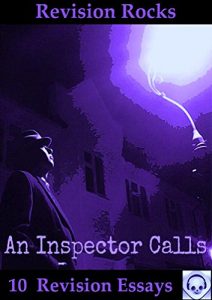Want an easy way to get a great English Literature GCSE grade for your ‘An Inspector Calls’ unit? Then this is the guide for you! No waffle, no going off the point, just great revision essays. They serve as a clear and concise revision tool, as they cover many of the key points that you would have studied in ‘An Inspector Calls’.
Essays topics covered are: How does Eric embody the spirit of reform and progress in the play?; How does Priestley use the character of Eva Smith/Daisy Renton to explore the theme of responsibility in the play?; Is it reasonable to say that Gerald is the most irresponsible character in the play, ‘An Inspector Calls’?; Was Priestley right to set his play in 1912?; How does Priestley present Inspector Goole in order to make him an effective character?; How does Priestley use language to create tension in the play 'An Inspector Calls'?; Why does Priestley make Mr Birling the complete opposite to the Inspector?; Is Mrs Birling’s treatment of Daisy evil?; How does Sheila’s character develop during the course of the play? and How does Priestley use structure to ensure that high levels of tension are maintained throughout the play?.
Essays topics covered are: How does Eric embody the spirit of reform and progress in the play?; How does Priestley use the character of Eva Smith/Daisy Renton to explore the theme of responsibility in the play?; Is it reasonable to say that Gerald is the most irresponsible character in the play, ‘An Inspector Calls’?; Was Priestley right to set his play in 1912?; How does Priestley present Inspector Goole in order to make him an effective character?; How does Priestley use language to create tension in the play 'An Inspector Calls'?; Why does Priestley make Mr Birling the complete opposite to the Inspector?; Is Mrs Birling’s treatment of Daisy evil?; How does Sheila’s character develop during the course of the play? and How does Priestley use structure to ensure that high levels of tension are maintained throughout the play?.






